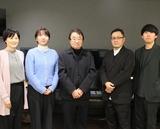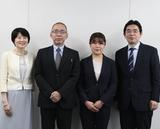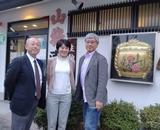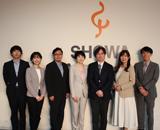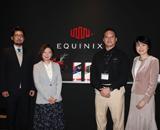January 2012
The Publishing Platform Business Rolled Out by Six Apart, Ltd.
MT As A Standard in Japan
Sato: A perception that Movable Type is the first thing that comes to mind when thinking of CMS is starting to spread among users that have a certain amount of knowledge, such as those at a company in charge of the web. In fact, there is an increase in the number of times I am asked, "How is it different from Movable Type?" when we propose a CMS product other than MT. As a vendor, it is much easier to propose, "We will build your website using MT" than to have to explain the CMS we'll be using. (Laughs) The strength that de facto standards have is really something powerful.
Nob Seki: As one developing a publishing platform business, we are fortunate to have that kind of recognition. It is a result of things having developed from blogs.
Sato: My impression is that the CMS market is becoming quite matured. In the case of MT, it often has to compete against even cheaper packages, including open source CMS. What is the key to differentiating MT from such CMS products?
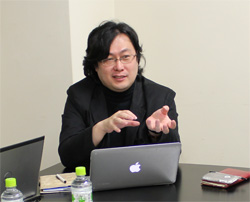
Nob Seki: I think it will be providing sound support while communicating regularly with customers. For example, if it is an open source product, the only response may be, "Please use the latest version" if a problem arises. However, there may be circumstances on the customer's side that prevents them from updating to a new version. That's why at Six Apart, we not only provide an updated version in which a security hole has been corrected but also continue to provide patches that correct security holes in previous versions of the software. This kind of response on our part is something that is valued by many users.
Ohsato: Arc Communications participates in the Six Apart partner network, ProNet. We feel that you provide excellent support not just towards users but for your partners as well. The choice of whether or not to use an open source CMS is an area that I think makes glaringly apparent the philosophy taken by the management of a company. Although there are many benefits to the use of open source software, it is difficult to make clear who takes ultimate responsibility and makes the response when a problem arises; how one should commit. This is an element that makes us as a vendor feel concerned when proposing open source software to a customer. For this reason, when we select the product to propose to our customers, we stress not only the quality of the product itself but also place heavy emphasis on whether the developer or distributor is a company that we can do business together with. In that sense, Movable Type is an extremely appealing product. Of course, there's also the fact that I'm great friends with you, Mr. Seki! (Laughs)
The Construction of an Eco System Centered on the Publishing Platform
Sato: You mentioned earlier the importance of maintaining a relationship with the US as well as marketability in Asia. However, I get the impression that right now the Six Apart business is focused around domestic services in Japan. What kind of a global rollout are you currently considering in terms of the provision of a publishing platform?
Nob Seki: What people expect from Six Apart is that we design a platform that can be operated by anyone. I think doing that is what will lead to our globalization.
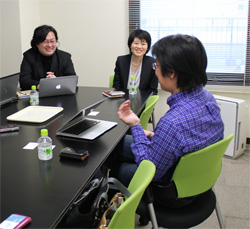
Sato: I recently handled an in-house project in which we constructed our corporate website in 44 different languages. For Arc Communications, which is a company that provides not only website planning and design services but also translation services, we wanted to show that we can not only carry out translations in 44 different languages but also write source codes in those 44 languages. It is important in terms of showing that we can respond to globalization as well as in expressing our brand that we don't just talk about our ability to do these things but actually execute them. In the case of Six Apart, which develops platforms, you're saying that making it possible for the platform to be used seamlessly is more important than localizing it to individual languages.
Nob Seki: We will promote our business from the position of strengthening the platform and developing the foundation for the development of solutions. I don't think that an eco system for this kind of business would be possible if we develop everything ourselves. I think that we need to draw a clear line and show where Six Apart's realm stops in order to have others participate in the eco system. Wouldn't co-existence and co-prosperity be difficult without it? That is why we will focus on strengthening the foundation, and we would like to ask for the help of your company and other partner firms in the development of solutions that will operate on our platform. We look forward to continuing to work with you!
Ohsato: I have often heard you speak of this "eco system" concept in the past. I see that your thinking has not strayed from this position at all! Thank you very much for your time today.
Mariko Ohsato's Postscript
Mr. Seki's talk, who spoke in a relaxed manner throughout, was so deep and rich in content that it is hard to believe that this dialogue was less than an hour long. He and I have many things in common, such as the fact we have changed where we stage our activities through the years, beginning as science and engineering majors while at university, going into the liberal arts, back into the sciences field, and again into the liberal arts field in our careers while considering our own characteristic. We are also linked by a curious fate. He is known as the Prince of Champagne, and I look forward to Arc Communications receiving champagne from him someday as a reward for building multilingual websites utilizing Movable Type!
Feature Interview Index

